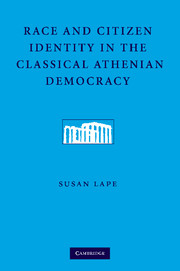Book contents
- Frontmatter
- Contents
- Preface
- Acknowledgments
- RACE AND CITIZEN IDENTITY IN THE CLASSICAL ATHENIAN DEMOCRACY
- 1 Theorizing Citizen Identity
- 2 The Rhetoric of Racial Citizenship
- 3 Euripides' “Ion” and the Family Romance of Athenian Racialism
- 4 Athenian Identity in History and as History
- 5 Trials of Citizen Identity: Policing and Producing the Racial Frontier
- 6 Myths and Realities of Racial Citizenship
- Abbreviations
- References
- Index of Names and Subjects
- Index of Passages Discussed
4 - Athenian Identity in History and as History
Published online by Cambridge University Press: 05 May 2010
- Frontmatter
- Contents
- Preface
- Acknowledgments
- RACE AND CITIZEN IDENTITY IN THE CLASSICAL ATHENIAN DEMOCRACY
- 1 Theorizing Citizen Identity
- 2 The Rhetoric of Racial Citizenship
- 3 Euripides' “Ion” and the Family Romance of Athenian Racialism
- 4 Athenian Identity in History and as History
- 5 Trials of Citizen Identity: Policing and Producing the Racial Frontier
- 6 Myths and Realities of Racial Citizenship
- Abbreviations
- References
- Index of Names and Subjects
- Index of Passages Discussed
Summary
IDENTITY AND HISTORY
Although Athenian sources have a great deal to say about racial citizenship and the myth of autochthony, this material is conspicuously absent from the works of the major fifth-century Greek historians, Herodotus and Thucydides. The historians' failure to engage directly with these issures is striking because they both offer accounts of early Athenian history and what might be called ethnogenesis; yet, rather than either endorsing or refuting Athenian racial myths, the historians elide them altogether. In so doing, they are not only denying Athenian chauvinism, but are also refusing the Athenian use of their identity fictions as shorthand explanations for crucial past events. In the Athenian history of Athens, autochthony says it all; it supplies a collective identity that is at once noble and a motivation for behavior. In funeral oratory, a genre that came into being during or after the Persian wars, Athenian speakers appeal to autochthony and the nobility it confers to explain their military achievements, both mythical and real. In some cases, speakers even provide a specific list of innate (and inherited) character virtues that both differentiate the Athenians from other Greeks and account for their successes.
The historians' silence on this tradition is, I argue, a constitutive one. That is, although they decline the Athenian identity-based version of the past, they take up the basic proposition that the identity of individuals and groups operates as a causal force in history, explaining why peoples and poleis behave as they do.
- Type
- Chapter
- Information
- Race and Citizen Identity in the Classical Athenian Democracy , pp. 137 - 185Publisher: Cambridge University PressPrint publication year: 2010



